Welcome to MEXA
Innovating Mental Health with AI
MEXA unites researchers, healthcare professionals, developers, and those with lived mental health experiences. Together, we use AI to solve mental health challenges through collaboration and events like hackathons, seminars, and more. Read more here.
Learn about how we integrate lived experience experts at MEXA.
Funded by Wellcome.
Blog
Free Academic Poster Template For Mental Health X Ai Researchers
Improve visibility, clarity, and accessibility for your research with this research-backed template
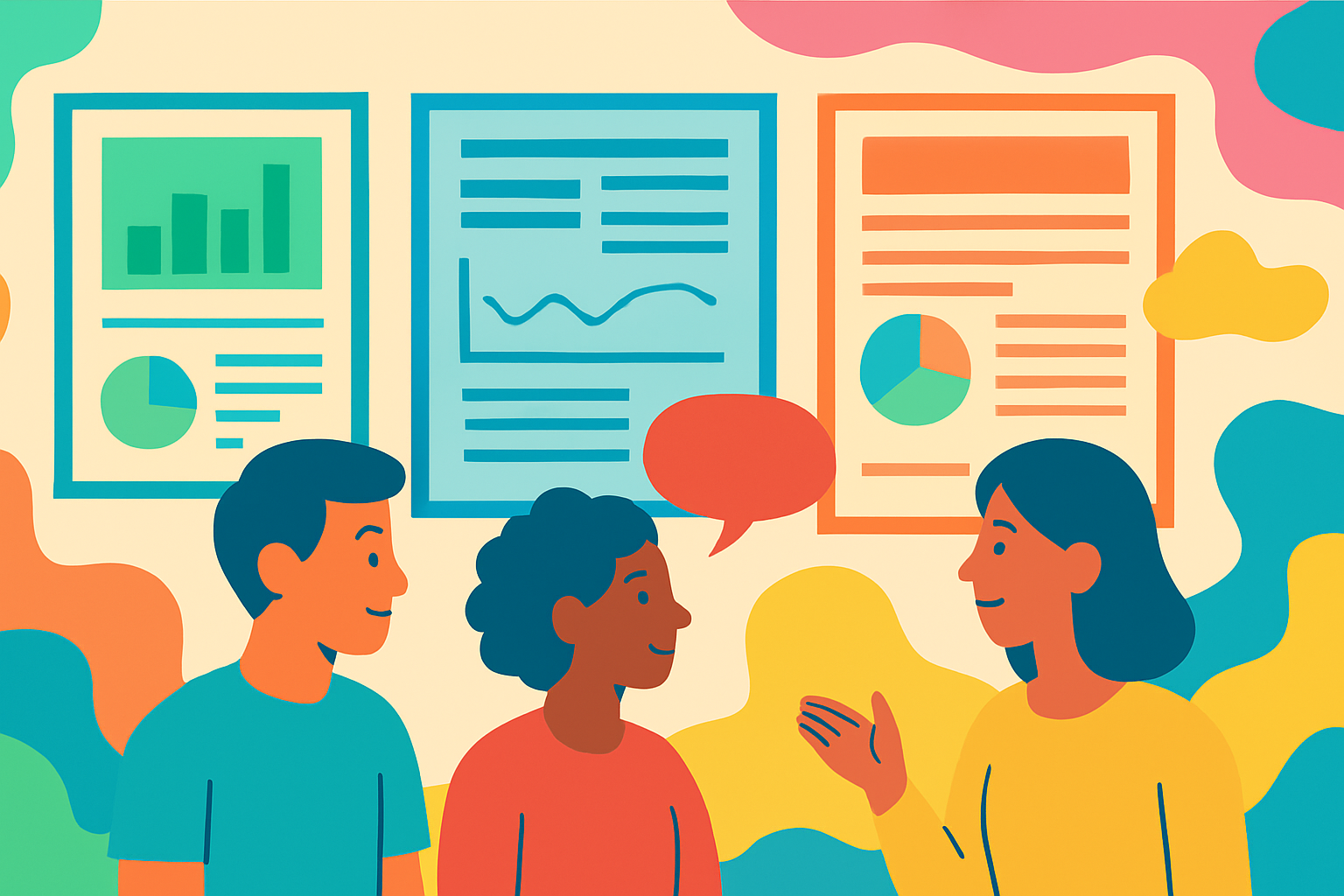
Poster sessions are a staple of academic conferences. Many of us know the feeling of walking into a poster hall and seeing rows of dense, text-heavy posters. They are often hard to read and even harder to remember. It can be hard for presenters too. Especially if they are working in a second language or having limited design experience.
That is why MEXA is excited to share an adaptable poster template that makes scientific posters clearer, more accessible, and more effective. This template builds on the work of the #BetterPoster movement and can be customized with your institution’s branding or used as-is with the MEXA branding.
Forty global teams in the MEXA Accelerator will be using the poster template to present their work at an in-person event. The Accelerator is a four month program advancing generative AI research for mental health in partnership with Neuromatch and funded by the Wellcome Trust. By sharing this poster template more broadly, we hope researchers across the MEXA community can also benefit.
Why rethink posters?
Mike Morrison, a psychologist and the creator of the #BetterPoster movement, saw posters as a bottleneck in science communication. He helped with the MEXA template. He explained, “Traditional posters often assume attendees will quietly read for ten minutes in a noisy, crowded hall. In reality, most people walk away overloaded by text and miss key findings. Posters should communicate the main point quickly and clearly, while inviting deeper discussion. That way, attendees can grasp the essential message at a glance and still explore the details if they want to learn more.”
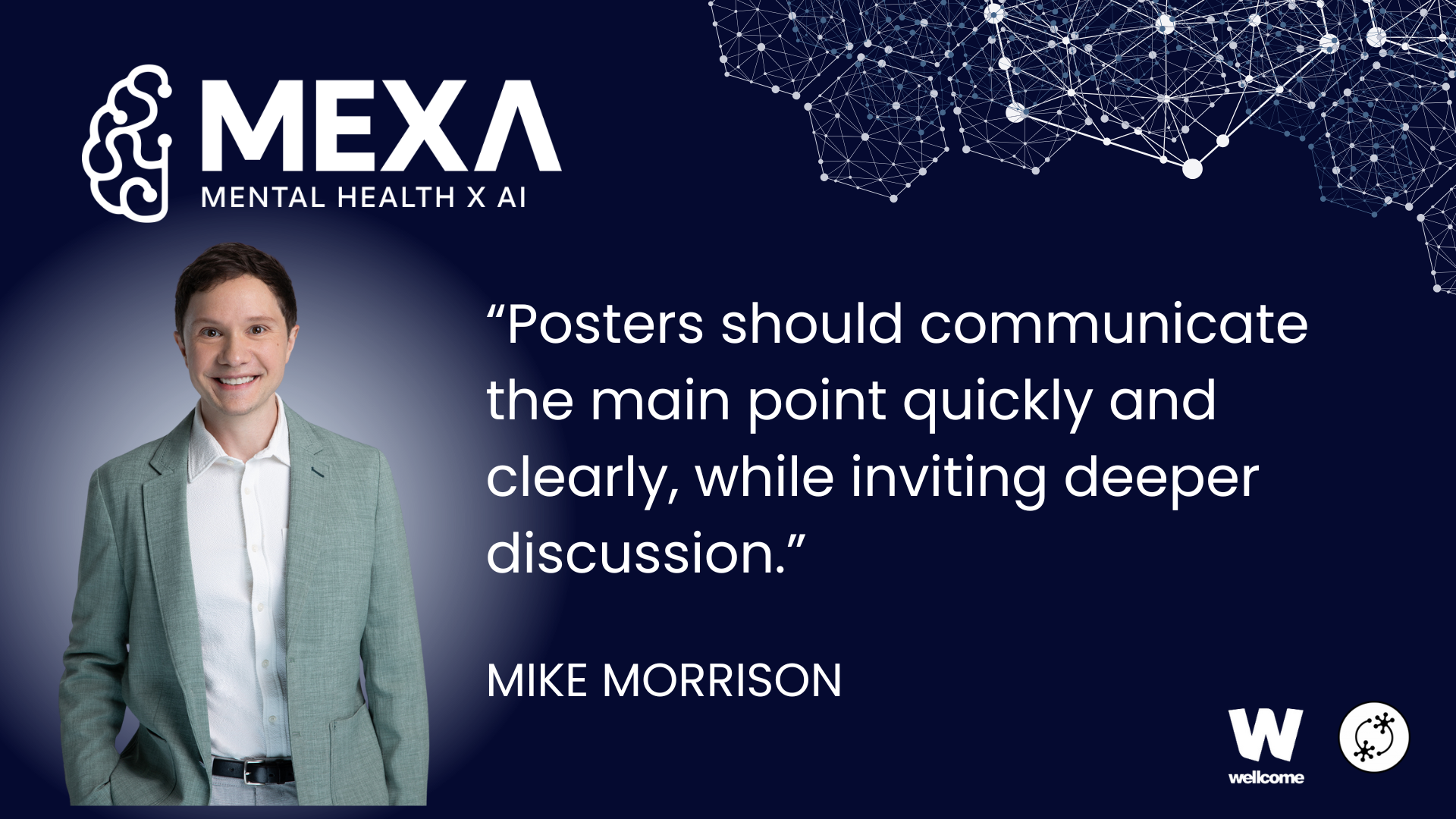
The poster template uses simple language, clean layouts, and designs that encourage conversation. It was developed based on research including surveys of conference attendees, how people move through poster halls, and feedback from researchers who used the template. This approach helped identify what makes posters easy to read, engaging, and memorable.
Posters for global impact
Poster sessions play a unique role in science communication. They create space for conversations, discoveries, and networking across fields. By making posters easier to read and understand, we lower barriers to participation. More people can share their ideas and learn from each other.
This is especially important in global programs like the MEXA Accelerator. Researchers come from many cultures, disciplines, and languages. The poster template helps ensure ideas are communicated clearly, no matter who is presenting or viewing.
Bringing it into practice
Rieke Schäfer, a volunteer with Climatematch Academy and Neuromatch’s Impact Scholars Program, has helped work on this template and sees its value especially for early-career researchers. “For many of us, conferences can feel intimidating, especially when presenting research for the first time. This poster template gives researchers a way to present confidently and clearly. This poster template lets researchers present confidently and ensures science is accessible to everyone, no matter their background or language. It also supports inclusivity for those new to a field, reading or presenting in a second language, or anyone who finds traditional posters overwhelming.”
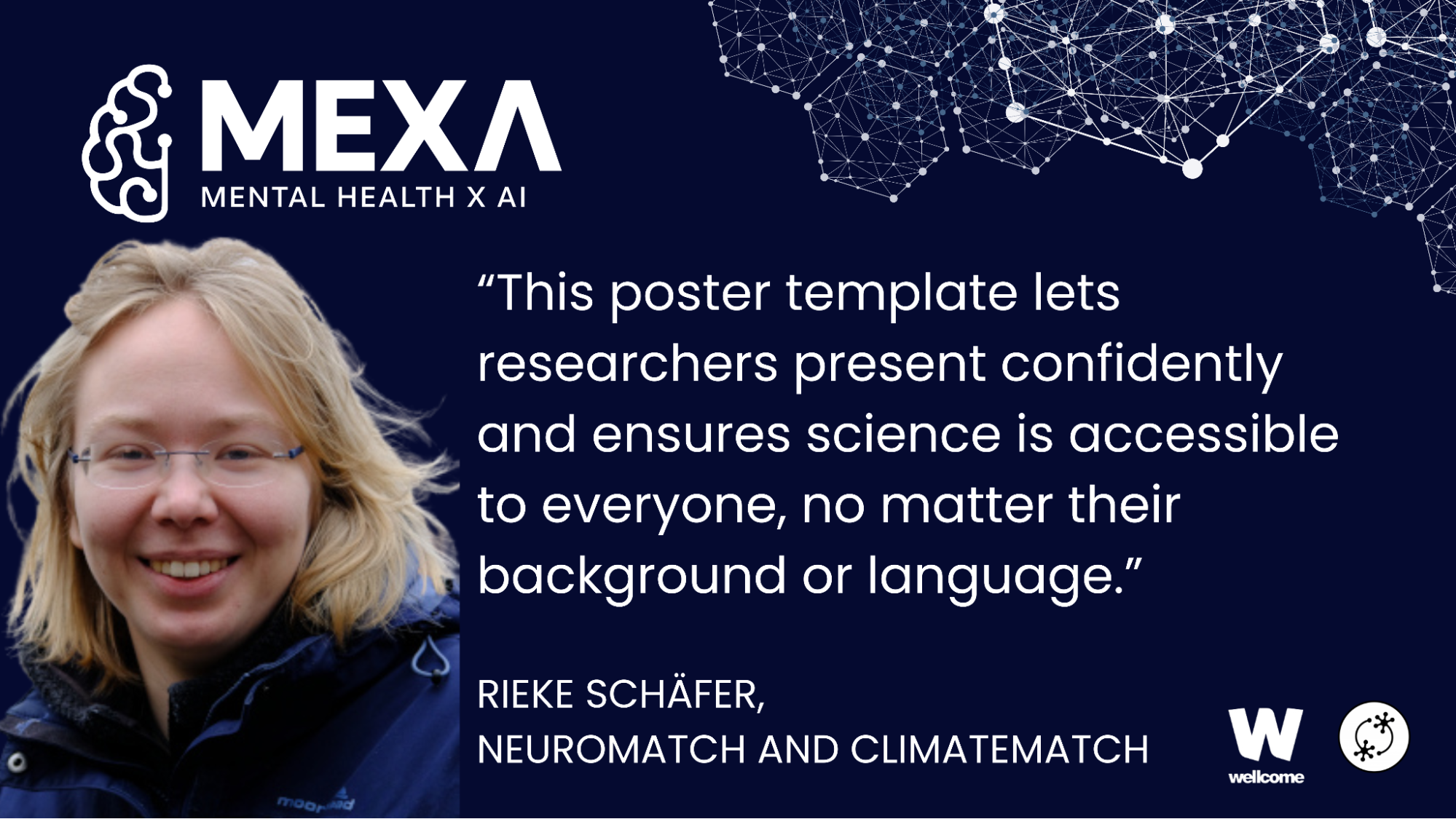
Rieke also notes that the template is flexible. It is a research-based starting point that anyone can adapt to their needs. While the posters come with MEXA branding, you can easily change the colors, swap in your own logos, and adjust the layout to fit your institution, project, or personal style. This makes it simple to create a poster that works for any conference or audience while still following evidence-based design principles.
Download the template and start creating your poster today!
We would love to see how you use the template. Share your poster with us by tagging MEXA on LinkedIn or X or submit a story to the blog.
If you are interested in this topic or want to get involved, visit ScienceUX. They publish and curate research, free resources, and tools to help scientists speed up their work through better, evidence-based UX design.
Living with Complex PTSD and Creating AI Solutions for Better Mental Health Care
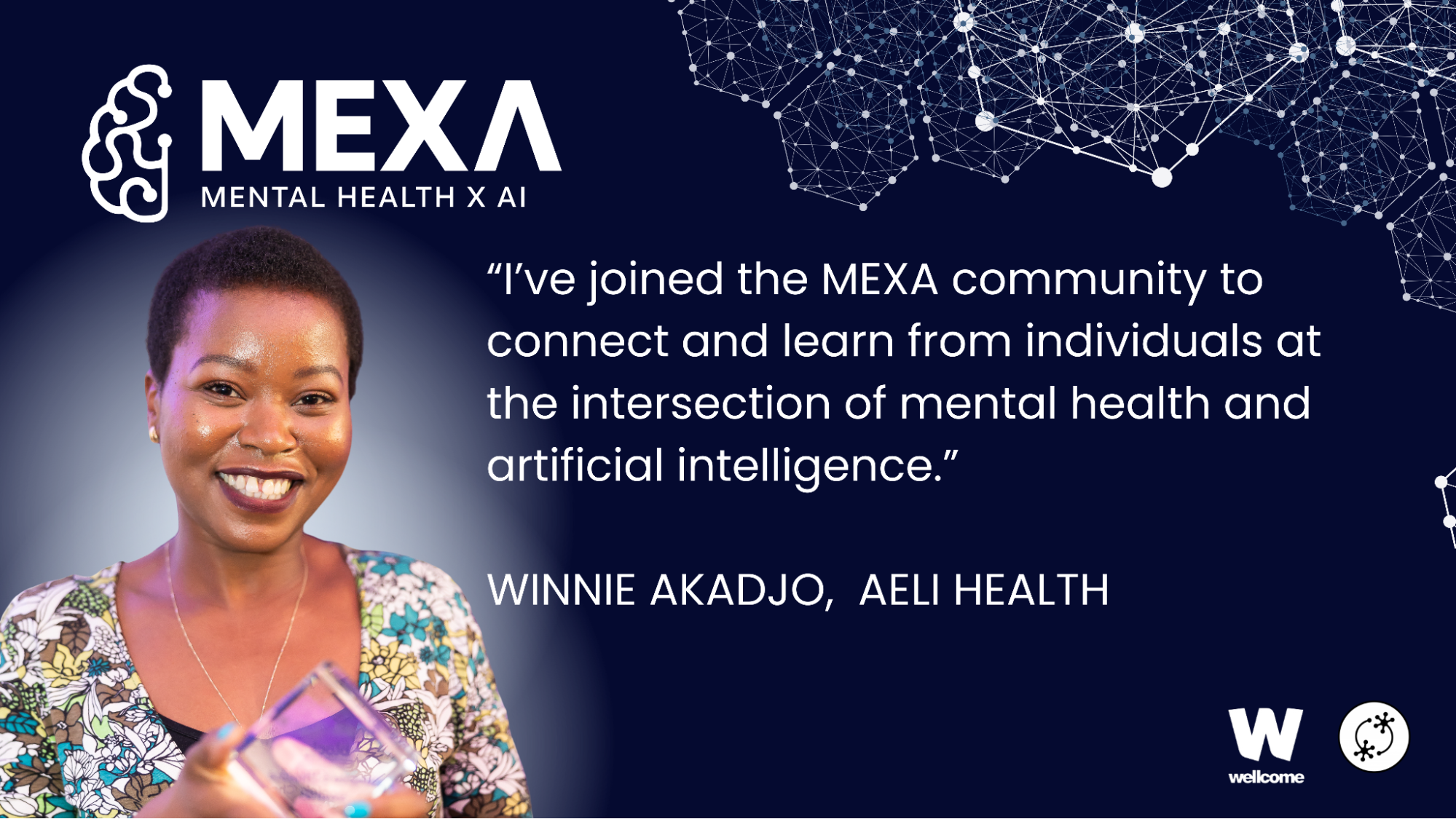
Living with Complex PTSD: My Journey
I was diagnosed with Complex PTSD at 23 after self-referring myself to a women’s therapy centre. It was during these sessions that my therapist told me that I had experienced more trauma than the average person. Before the age of 18, I had experienced adverse childhood experiences in the form of sexual abuse, neglect, a teenage pregnancy, attempted suicide and then hospitalised for eight weeks.
The outcome of these experiences led me to become addicted to alcohol and smoking as a way to self-soothe from the difficult emotions I was struggling to process on my own.
PTSD and Complex PTSD: A Global Challenge
An estimated 3.9% of the world’s population has had post-traumatic stress disorder (PTSD) at some point in their lives, and 6.6 million people in the UK are expected to have or are living with PTSD or Complex PTSD.
I make up 1 in 4 out of 100 people who have PTSD in the UK.
Barriers to Support: Stigma, Cost, and Marginalisation
Following the diagnosis, I struggled with depression and had to research and learn how to manage my mental health to overcome the negative effects of my adverse childhood experiences, especially coming from a marginalised community where mental health is still seen as taboo and access to therapy is unaffordable. The average cost of six sessions of therapy in London is £600. As well as this, readily available mental health practices for those navigating PTSD are limited.
From my lived experiences, I knew the biggest challenges I had faced were a lack of knowledge about PTSD symptoms and how trauma manifests in our daily lives. At the most difficult moments of my mental health journey, I failed to recognise the symptoms of PTSD when they occurred, so that meant I didn’t know how to handle the symptoms without relying on negative coping mechanisms.
Building Aeli Health: The Vision
Hence, why I’m building Aeli Health, a user-to-user software solution for mental health professionals with a suite of generative AI tools to ‘Create, Assign, Analyse and Manage Crisis’. By combining human expertise with generative AI, I aim to create evidence-based tools, practices and agents to help clients take a proactive role in managing their mental health 24/7, including support with recovery from substance abuse and interventions during moments of crisis.
Based on the interviews I have conducted with 35 mental health practitioners, this model provides a structured way for therapists and publicly funded organisations to share best practices between sessions, creating a comprehensive and connected support system that enhances client care and improves the global mental health epidemic.
Joining the MEXA Community & My Path Forward
I’ve joined the MEXA community to connect and learn from individuals at the intersection of mental health and artificial intelligence. Building Aeli Health from lived experiences means I have gaps in my knowledge when it comes to the psychology of mental health, industry regulation, and policies that could deter product innovation. I’m also excited by the possibility of meeting potential team members, mentors, advisors or users of the platform.
In addition to joining the community, I am beginning an MSc in Psychology at City St George's in an effort to further my research in AI and mental health with an aim to build products that bridge the 168-hour gap between therapy sessions.
Winnie Akadjo is building a secure and accessible platform with a suite of generative AI tools for mental health professionals to bridge the 168-hour gap between therapy sessions. As a care-leaver with complex PTSD, Winnie's journey has deeply informed her understanding of resilience and the importance of mental well-being.
User Needs, Real Lives: Insights from a Product Designer with Mental Health Lived Experience

Thoughts on designing products for people with mental illness from a product design director who has suffered through her own severe mental illness
In one of the photos in my selfie collection, I’m clutching the Emmy we’ve just won and grinning ear to ear. But every time I see that photo, I mourn a bit. The win was real, but my enthusiasm was entirely fabricated. Underneath that grin, I was absolutely desperate—exhausted from relentlessly drowning in anguish, tormented by an endless torrent of cruel intrusive thoughts, and yearning, longing, wishing, hoping, with every fiber of my being…to be dead.
I needed help.
Behind the Smile: A Hidden Reality
As the product design director of emerging digital products at NBC, I spend a lot of time in conversations around user needs. The AI, app, and web teams I manage are asking the important questions of, “How do we build something that is actually valuable and not just another technological gimmick?” I’m proud that our organization manages to be dedicated to the real humans we build for. As is appropriate in our domain, we’re purposefully considering how to make things that are useful and create joy—both real human needs. (Have you ever run a prompt on Cat GPT?? Try and argue with me that the world is not a better place because humor like that exists.)
But, I’ve never met a user need as profound to me as mental health and so, as you embark on your journey to build AI products that make a difference in the world, I’m here to have the same kind of conversation with you that I have with my talented colleagues as we design products—let’s honor the real humans we are building for by serving them in ways that matter to them. But to do that, you need to know who they are and what they really need.
Meeting Real Needs Starts with Real Stories
Unlike the user needs I encounter in my day job, the ones you are going to have to understand and address to build a successful product can be quite elusive. Mental illness is a pervasive but incredibly invisible reality. No one celebrating the Emmy win that day had any idea that, in the midst of our cheerful conversations, I was haunted by the presence and reality of my own deeply desired death.
The fact that we casually use the word “depression” to mean anything from mild disappointment to a debilitating brain disease goes a long way to obscure the intense suffering of the severely mentally ill in our midst, as does the dehumanizing stigma that exists around all brain diseases.

I don’t know that I’ve found the right words to adequately convey the needs found in that suffering, or if the right words even exist, but nonetheless we need to talk about it. We need to talk about it because this mission you’ve embarked on—to use technology to address the suffering of mental illness—MATTERS. The user needs are REAL They are DEEP. But to meet those needs, you need to meet your users. You have to hear their stories. I certainly can’t speak for everyone with severe mental illness, but I can share my story.
“They assume that, if I had tried harder and been more positive, I could have just “gotten over it.” I couldn’t.”
I’ve always been a high functioning, slightly awkward but very friendly person, so when I say I struggled with depression, people assume I was feeling pretty down. They don’t assume that I lived in constant, unyielding despair, was incapable of feeling any pleasure, couldn’t escape my deep, scathing self-hatred, had intense physical urges to end my own life, and couldn’t stop the stream of incessant intrusive thoughts that I didn’t deserve to be alive anyhow. They assume I had a pervasive “bad mood;” they don’t assume my own brain was trying to kill me. They assume that, if I had tried harder and been more positive, I could have just “gotten over it.” I couldn’t.
I was lucky though—after 21 different antidepressants, 15 years of therapy, 72 sessions of transcranial magnetic stimulation, two years of monthly IV infusions of ketamine, 40 rounds of electroconvulsive therapy, and two in-patient psychiatric hospitalizations, I finally wearily stumbled upon the clinical trial that saved me from the vortex of agony.
A team of incredibly compassionate scientists, data analysis, doctors, and other medical practitioners went out of their way to understand and address their patients’ needs. (No one ever tried harder than the principal investigator on the study to understand my actual experience of the disease!) And so they were able to use their innovative, persistent spirit to develop a new treatment that turned my life around completely—after receiving the deep brain stimulation implant, my decades-long “treat-resistant” disease vanished in five days.
All of the sudden, I discovered what it felt like to feel calm. I felt enjoyment for the first time in my adult life. I finally heard the silence of a quiet mind, and my intense cravings and intrusive thoughts about death vanished. For literally the first time in 23 years, I could finally smile—and MEAN it.
Designing with Compassion Changes Lives
When you create solutions for people in this space, you are giving us a gift that is incredibly profound. I received not just the ability to exist in the world without constant, severe mental pain, but also the desire to even exist at all. My life is staggeringly less miserable, but I also finally have what most people take entirely for granted: the ability to be at peace with the fact that I’m alive.
I’d just like to make sure, before I end, that I express my heartfelt gratitude for the work that you are doing for people like me. Our needs may often be hard to see, but they are significant. You have the power to meet those needs and your desire to use that power for the good of those still suffering is deeply inspiring, encouraging, and humanzing. Thank you.
Amanda Geisinger is the product design director for emerging products at NBC News Digital. She also nurtures a daily practice of cartoon making, capturing the small, sweet and delightful moments she encounters on the streets of New York City, where she lives. She’s a lived experience expert, surviving more than two decades of severe major depressive disorder.
Building a Community to Power the Future of AI and Mental Health Research

Over the past several months, MEXA has been dedicated to fostering a thriving community at the intersection of mental health and artificial intelligence. Through many workshops, panel discussions, match-making, and collaborative events, we've brought together researchers, clinicians, and lived experience experts to explore how generative AI can improve mental health outcomes. Through these events and opportunities, we’ve put the focus on connection with the goal of community members meeting each other and growing budding collaborations.
Now, all that work has culminated in an exciting new opportunity: the MEXA Generative AI for Mental Health Research Accelerator. This four-month program is designed to support interdisciplinary teams as they prepare foundational research on using generative AI to improve measurement and intervention in anxiety, depression, and psychosis. With generous funding from Wellcome, this accelerator will provide the mentorship, strategic guidance, and resources teams need to pilot research and model development — ultimately positioning them for a unique and exclusive(!) funding opportunity from Wellcome of up to £3 million per award.
Through my time supporting MEXA’s many events, I've seen the enthusiasm of our presenters, panelists, and participants. Together we’ve explored what it means to embed lived experience in your work, how to think about the unique risks and benefits of using health data in LLMs, and what’s happening already at the cutting edge of mental health and AI research. As a community we’ve also hosted two awesome hackathons that resulted in thoughtful and imaginative projects. The accelerator builds on this strong foundation the community has established — a network of experts eager to push the boundaries of what’s possible with AI and mental health research.
Participants in the accelerator will gain:
- Comprehensive support for developing compelling research proposals
- Practical workshops on designing pilot experiments and managing collaborative research projects
- Funding for both pilot research and model development
- Financial support for team members without existing salaried positions
- Expert guidance for integrating lived experience into research
- Ethics support to ensure responsible AI development
Our journey as a community has always been about bringing together diverse voices — from researchers to those with lived mental health experiences — to develop solutions that are both innovative and meaningful. The accelerator represents the next major step in that journey.
If you're a researcher, clinician, developer, or lived experience expert interested in joining a team or forming your own, I encourage you to participate. Applications are open to teams worldwide (see full applicant requirements here), and individuals seeking to join a team can be matched with a team during the Expression of Interest stage ahead of the Accelerator application deadline. I also encourage you to lean on the connections you’ve made over the last several months to build a diverse team.
To learn more, join us for the Accelerator Launch Webinar on 24 March 2025. Choose the session that works best for you: 10:00 - 11:00 UTC or 17:00 - 18:00 UTC. You can register here.
This accelerator is more than just a program — it's the culmination of months of community-building, shared knowledge, and collective ambition. I can't wait to see the incredible projects that will emerge from it.
Stay connected with MEXA, and let's continue building a better future for mental health together.
Contributed by Courtney Dean
